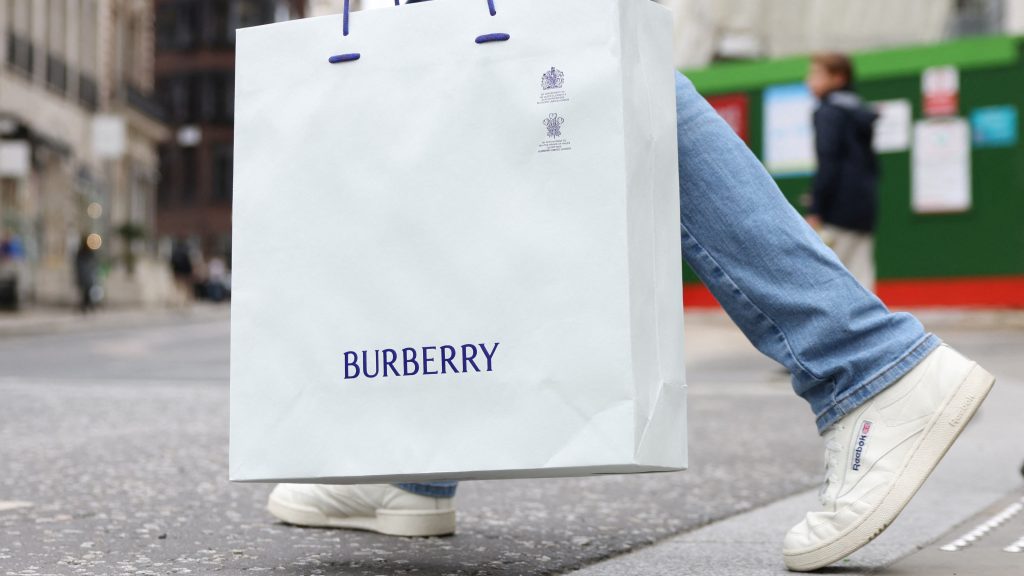UK Luxury Brand Burberry Gets New Boss To Revive Revamp

British luxury group Burberry on Monday sacked its CEO and named former Coach boss Joshua Schulman to replace him, as it promises a “more familiar” look and presses on with efforts to revive the brand by moving upmarket.
It also warned on profit and scrapped its dividend, sending its shares to their lowest in more than a decade.
A slowdown in the luxury sector has hit the 168 year-old name harder than rivals as customers were largely unimpressed by a style shift that aimed to expand beyond classic trench coats and accessories and command higher prices.
For the 13 weeks to June 29, underlying sales slumped 21%. On current trends, Burberry would report an operating loss for the first half and miss annual profit forecasts, it said, prompting it to scrap this year’s dividend to invest in growth.
Shares in Burberry, which has been the worst performer among luxury stocks over the last five years, fell 17% to 738 pence, trading at levels last seen in 2010.
The business has been in a protracted turnaround.
Schulman, who was the CEO of U.S. brand Michael Kors from 2021-2022 and before that boss and brand president at Coach, will be Burberry’s fourth CEO in 10 years.
He takes over on Wednesday from Jonathan Akeroyd, who has been in the job for two years.
Burberry has had three designers over the last decade. Daniel Lee in 2022 replaced Riccardo Tisci who left after less than five years.
Known for dressing the English upper class in its classic camel, red and black check print, Burberry said its new offer would be “more familiar” to its core customers.
The group’s chair Gerry Murphy told reporters Lee was staying with the company and the new CEO would not abandon efforts to take the company towards the higher end of luxury, which has been resilient in the face of reduced discretionary spending.
“The appointment of Josh does not signal a repositioning of Burberry’s ambition,” Murphy said, when asked if Burberry could become a UK version of his former employer Coach, a U.S. brand known for accessible luxury.
“It’s very much about a nudge of the tiller and adjustment rather than a fundamental change of strategy,” said Murphy.
The company first raised the issue of needing to return to its classic designs after a sharp fall in sales in May when stores featured Lee’s collection of bold, more expensive runway fashion.
Only the high end of the luxury sector has withstood the impact of inflation and economic slowdown, together with a property crisis and record youth unemployment in the potentially huge Chinese market.
Adding to investor concern about slowing Chinese demand, Swatch Group, the world’s biggest watchmaker, reported a steep drop in first half sales and earnings on Monday.
Burberry has the luxury sector’s weakest PE ratio, which is widely used in financial markets to gauge the relative value of stocks.
It stands at 16 times forward earnings over the next 12 months compared with 22 for other global luxury stocks.
At the same time, Burberry’s warning on Monday knocked confidence in its peers. European luxury groups Hermes and LVMH both traded down more than 1%.
Analysts anticipated Burberry would shift its strategy more than it has so far admitted.
“Investors were becoming increasingly frustrated with the performance at Burberry and looking for a change in strategic direction. We expect that this will start as a gentle turn but will evolve into a larger shift over time,” Deutsche Bank analysts said in a note.
The bank has a hold rating on the stock and a price target of 800 pence.
Asked about reported job cuts, CFO Kate Ferry said the company would be seeking cost savings and a few hundred roles could be cut, mostly in its UK corporate division, but she could not comment further.
(Reporting by Sarah Young in London, additional reporting by Mimosa Spencer in Paris, Yadarisa Shabong in Bengaluru; Editing by Mrigank Dhaniwala, Kate Holton and Barbara Lewis)




